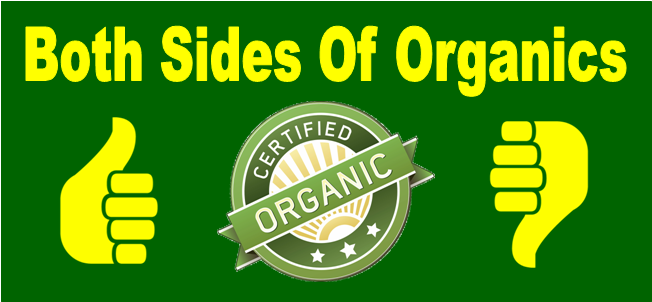Both Sides Of OrganicsThis page was undated 7-19-2021 |
|||||||||||||||||||||||||||
 |
One of the biggest debates going on today is over organic, natural, and conventional farming methods. I want to help you decide. |
|
|||||||||||||||||||||||||
|
Certified Organic is more about the process than the product. There many rules that must be followed in order for food to be certified organic. The land must be certified, the fertilizer must be certified, the way the food is processed or handled must meet certified standards. But there are no tests for quality, appearance, taste or nutritional value. |
|||||||||||||||||||||||||||
|
There is a cost in being certified organic. "Many small farms can be certified for approximately $750 the first year and between $375 and $575 in later years. Small organic food processors are routinely certified for about $1,250 in the first year and approximately $950 in later years. Mid- and large-size operations receive competitive fees". (From CCOF.org). Because organic growers must have proof that their growing process meets the standards set by state and federal regulatory agencies consumers can be assured how their food is produced. |
|||||||||||||||||||||||||||
|
Being certified organic does not mean certified better. When the nutritional value of certified organic food is compared to non-certified food of the same variety they are the same. In some cases organic vegetables do contain more trace minerals than conventionally raised or hydroponically grown vegetables. Trace minerals are naturally contained in soil and best absorbed through the roots of plants. They are released from the soil when water dissolves the minerals and then the minerals are carried by the water into the roots. Over time the mineral content of can be depleted if they are not properly managed. While reparable organic growers do use practices that help replace these trace minerals, so do most non-organic growers who use livestock manure, quality compost and other quality fertilizers. Another important way these trace minerals are replaced and made available is through the presence of earthworms and the billions of microbes living in soil. Earthworm castings are one way God chose to replenish soil fertility and can not be duplicated. It is true that more earthworms are seen in the soil of organic farms they are also equally seen in soil of non-organic farms who use practices that encourage earthworm growth. Hydroponic growers use water with these trace mineral added but they are not in their natural state as in soil. And it is obvious there no earthworms or microbes in the water. This is also true of soils in greenhouses. But do not discount the quality of vegetables grown in greenhouses or hydroponic houses. Both provide quality, fresh vegetables when produced through reputable practices. And they provide a year-round supply. |
|||||||||||||||||||||||||||
|
Most vegetable growers use safe methods. It seems to me most certified organic and natural producers must rely on only statements instead of facts. Why don't they have certified nutritional information facts comparing the the products they raise and the same products raised by conventionally? |
|||||||||||||||||||||||||||
|
|
|||||||||||||||||||||||||||
|
Links To Websites For Organics Information
|
|||||||||||||||||||||||||||
